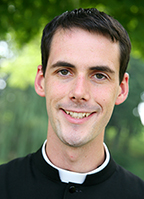Joseph — an icon of God’s fatherhood — models strong, silent, sacrificial life

Father Timothy Hepner
By Father Timothy Hepner
Fourth Sunday of Advent/Dec. 18
Isaiah 7:10-14; Psalm 24:1-2,3-4,5-6 (7c,10b); Romans 1:1-7; Matthew 1:18-24
In Advent, Jesus, Mary, and John the Baptist get top billing. But in this last Sunday of the season, the humble figure of St. Joseph quietly enters the scene. Joseph, husband of Mary, has no words to say in all of Scripture — and I know a few wives who would say that this alone is proof of his sanctity. Instead, he is all action. He is contrasted to the fickle King Ahaz who, in our first reading, refuses to believe God’s sign that “the virgin shall conceive, and bear a son, and shall name him Emmanuel” to show that he will be victorious over his enemies and his kingdom will be preserved.
Joseph, who is in the line of King David, has his doubts when he learns of Mary’s pregnancy. Perhaps he was unsure about how she got pregnant, or maybe he doubts his worthiness to be the foster father of the messiah. Either way, when Gabriel quotes the prophetic sign to him, Joseph doesn’t hesitate or waver like Ahaz did. He immediately takes Mary, the precious Ark of the New Covenant, into his home so that he can protect her and the presence of God within her. Through silent obedience he becomes the husband of the Immaculate Conception and the foster father of the Son of God. What man wouldn’t tremble, knowing the immensity of this role?
Through silent obedience he becomes the husband of the Immaculate Conception and the foster father of the Son of God. What man wouldn’t tremble, knowing the immensity of this role?
Joseph’s fatherhood is at once mysterious and natural. St. John Paul II wrote, “Joseph’s fatherhood — a relationship that places him as close as possible to Christ — comes to pass through marriage to Mary, that is, through the family.” At the finding in the temple, Mary acknowledges Joseph as Jesus’ father (Luke 2:48).
Fatherhood can come about in different ways. In my family, some of us are children of our parents by birth and some by adoption. As a priest, I carry the title “Father” because I give God’s children life through baptism, the Eucharist, and reconciliation. I also lead, teach, and spiritually protect them like a father.
FRIEND, PROTECTOR, INTERCESSOR
In Joseph, every type of father can find a friend, protector, and intercessor. And he shows us that the various types of fatherhood are not all that different. As a director of priestly vocations, I often find myself trying to communicate this to young men and their families.
At our website, comeandfollowme.org, we have a powerful short video of the parents of one of our seminarians who gradually came to realize that, by entering seminary, their son was not entering into a sterile and lonely life without a family. Instead, he is giving up one family to have hundreds. Like Joseph, whose celibacy allowed for the salvation of the world, this seminarian’s choice will be incredibly fruitful.
Spiritual and natural fatherhood resemble and enrich each other. Natural fathers who work hard and sacrifice for their wives and children remind me not to live a “bachelor” priesthood — my life has to be about others. Hopefully, my fatherhood reminds other men that preparing their families for this life is not their only or most important task. Instead, we’re called to give our children life through the sacraments, to nourish that life through daily prayer, and to protect that life by teaching them the moral life through word and example.
True fatherhood in any form is not easy. I fall short every day, and I know from countless fathers’ confessions that they do to. But thankfully God is a Father of mercies.
St. Joseph is icon of God’s fatherhood; I’m often aware of his strong, silent presence in my life. I pray that more families are open to the possibility that their son could be called to the awesome and fulfilling vocation of spiritual fatherhood. Let’s pray that all fathers can draw closer to him.
—–
FATHER TIMOTHY Hepner is vocation director of recruitment for the Diocese of Peoria. To learn more about vocations, visit comeandfollowme.org or follow the office on Facebook at followmepeoria.





